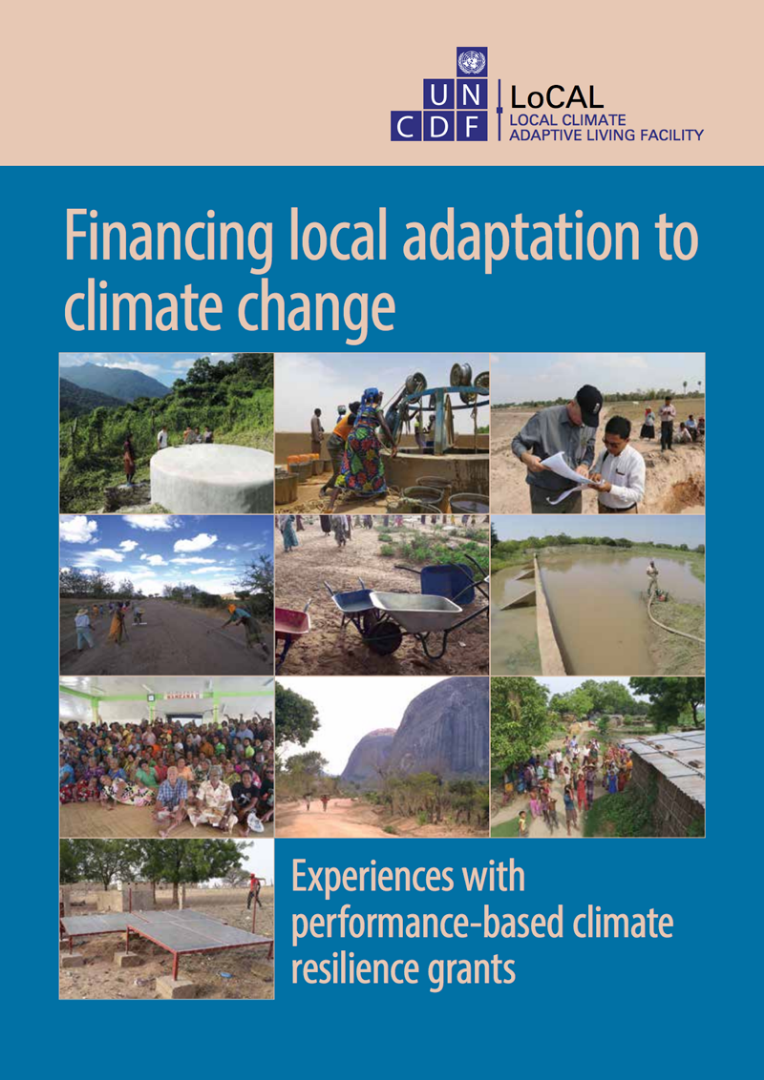UNCDF's Subnational Climate Resilience Publication Integrated Into Nap Technical Guidelines of UNFCCC
Tags
The LoCAL Programme’s Publication on “Financing Local Adaptation to Climate Change: Experiences with Performance-Based Climate Resilience Grants” will support least-developed countries (LDCs) bridge national with subnational climate plans and actions as called for in the Paris Agreement
The United Nations Capital Development Fund’s (UNCDF) flagship programme to advance subnational climate adaptation and resilience was officially recognized today in Songdo, Korea by the United Nations Framework Convention on Climate Change (UNFCCC) as a supplementary material to the NAP Technical Guidelines, highlighting the contribution of subnational governments in promoting local adaptation while bridging national with subnational adaptation plans. The 2015 Paris Agreement of the UNFCCC, in fact, calls on the need to integrate policies and actions, particularly at the sub-national level.
The publication—“Financing Local Adaptation to Climate Change: Experiences with Performance-Based Climate Resilience Grants”—is the product of UNCDF’s Local Climate Adaptive Living Facility (LoCAL) Programme. On Monday, LoCAL’s publication was officially integrated as a supplement to the technical guidelines that the UNFCCC endorses for least-developed countries (LDCs) to assist them “reduce vulnerability to the impacts of climate change, by building adaptive capacity and resilience, and by facilitating the integration of climate change adaptation into development planning”, also known as the National Adaptation Plan (NAP) process.
Both the LoCAL programme as well as “Financing Local Adaptation” are intended to support local governments and communities, particularly in LDCs, by enabling them to contribute effectively to confronting climate change. By being integrated as a supplement to the NAP technical guidelines of the UNFCCC, the LoCAL-NAP publication will provide critical guidance on how local governments can promote climate change–resilient communities and local economies by establishing a standard, internationally recognized country-based mechanism to transfer climate finance, from different sources, to subnational governments through national institutions and systems for building verifiable climate change adaptation and resilience.
Ms. Judith Karl, UNCDF’s Executive Secretary, said “local authorities are central actors for the successful implementation of the NAP process. The LoCAL Facility enables them to access and make the best use of climate finance and to mainstream climate change concerns into local public planning and budgeting systems, in a participatory and gender responsive manner. We believe our publication will be an important instrument to support both national and subnational governments, particularly in LDCs, to promote resilience and increase adaptive capacity at the local level, where climate change adaptation actions are most needed.”
The LoCAL programme, which inspired and authored “Financing Local Adaptation to Climate Change” is supporting the mainstreaming of climate resilience and adaptation through financial support in the form of performance-based climate resilience grants, technical and capacity building support, and annual performance assessments. LoCAL is currently working with 107 local governments in 14 countries, representing over 6 million people.
Looking to the future, LoCAL has committed to engaging with climate institutions and development partners, including the Green Climate Fund, to ensure a systematic and strategic approach to climate finance that recognizes the fundamental role of local governments in delivering on the goals of the 2015 Paris Agreement and of the Agenda 2030.
